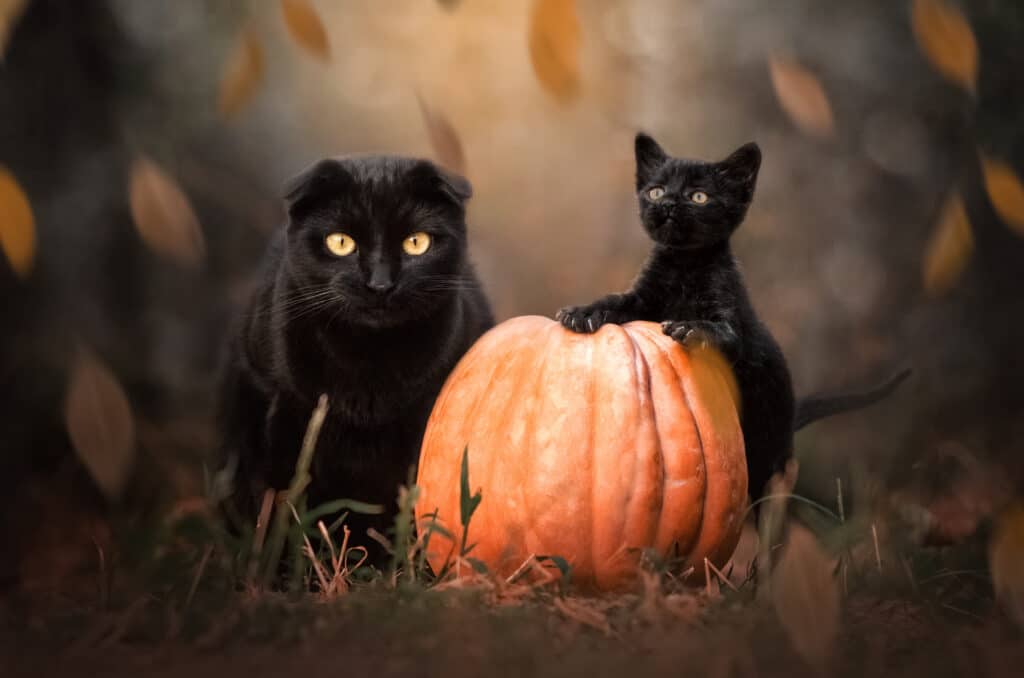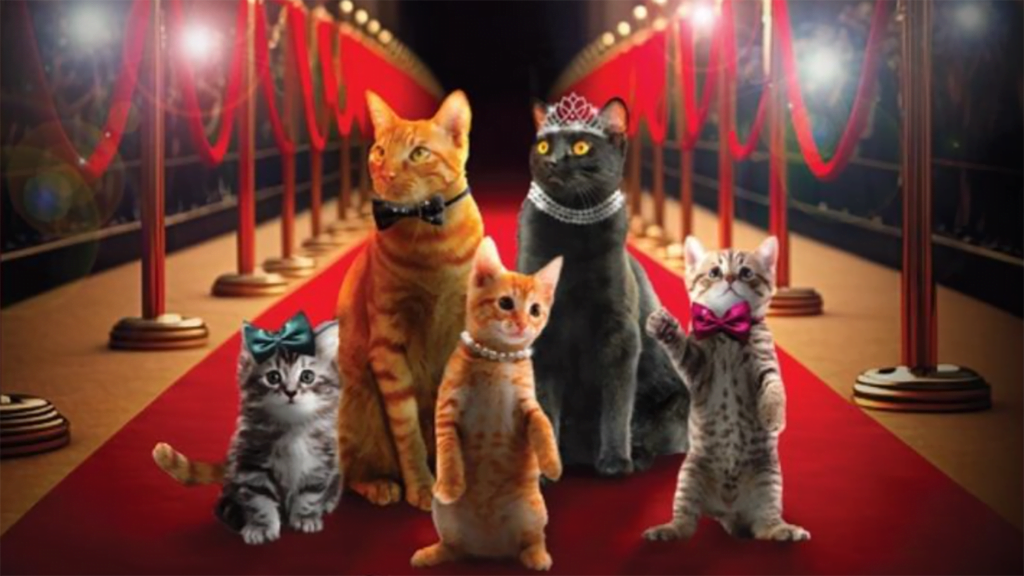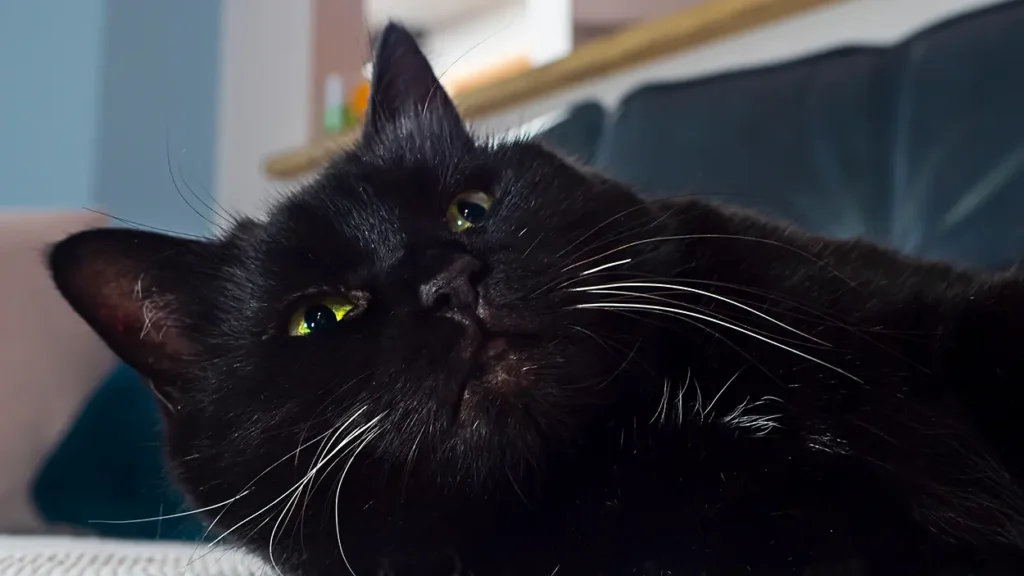Black Cats: The quintessential icons of Halloween’s spooky charms

Unraveling the Mystique of Black Cats
As Halloween approaches, the allure of black cats becomes intertwined with the enigmatic spirit of the season. These sleek and mysterious creatures have long been associated with the holiday, often depicted as symbols of witchcraft and superstition.
However, beyond the Halloween mystique, these sleek and mystical creatures have long been the subject of various superstitions and legends, but there’s so much more to them than meets the eye. We’ll shed light on why they shouldn’t be feared and deserve our love and appreciation. As the spooky Halloween holiday draws near, join us on a mesmerizing journey as we delve into the captivating world of black cats, exploring their superstitions and rich history.
Historical Superstitions and Folklore
Black cats have been associated with both good and bad omens throughout history, becoming the unwitting victims of superstitions. While many cultures consider them as good luck symbols, others have perpetuated superstitions that cast them in a sinister light.
In most Western cultures, black cats have typically been looked upon as a symbol of evil and suspected of being the friends and companions of witches or shape-shifting actual witches themselves. In some European folklore, black cats were believed to possess supernatural powers associated with witchcraft. These superstitions were fueled by the fear and paranoia surrounding witch hunts during medieval times.
Black cats have been cherished and revered in various ancient civilizations. In ancient Egypt, for example, black cats were revered and considered sacred. They were believed to embody the goddess Bastet, often depicted with the head of a lioness or domestic cat. Bastet was the goddess of home, fertility, and protection, and was believed to protect against evil spirits and bring good fortune. The Norse goddess Freyja was also closely associated with cats and was believed to travel with a pair of giant black cats, who pulled her chariot. Black cats held a special place in these cultures, symbolizing protection, fertility, and even divinity.
The superstitions surrounding black cats vary from culture to culture. Black cats have positive associations in Japanese folklore he Celtic nations. Black cats were sacred in Celtic mythology. Scottish lore holds that a black cat’s arrival at a new home signifies prosperity, while Welsh lore states that a black cat brings good health.
The mix of positive and negative associations may have given rise to the later belief that black cats were omens capable of bringing both good and bad luck. One tradition states that if a black cat walks towards someone, it is said to bring good fortune, but if it walks away, it takes good fortune with it. In 18th century pirates believed that if a black cat walked onto a ship and then walked off it, the ship was doomed to sink on its next voyage.
When the Pilgrims arrived in America, they brought along a deep suspicion of anything deemed of Satan. Their belief that black cats were associated with witchcraft and demonism led to people killing black cats.
Modern-Day Symbolism
Despite the lingering superstitions, black cats are cherished and adored by many people around the world. In modern times, they have become symbols of resilience, independence, and mystery. Many cat lovers appreciate the unique beauty and elegance that black cats possess. Some people even consider black cats to be good luck charms, with positive associations still prevalent in various cultures, including Japan and Scotland.
In modern Western culture, it is still believed that when a black cat crosses your path, it symbolizes that an important change will take place in your life. The black cat you encounter is thought to represent the end of one phase and the beginning of another. As in past times, the connotation may be positive or negative. The black cat crossing your path could be a sign of good changes ahead or the foreboding of dark times on the horizon.
Black cats are often the last to be adopted. It is unclear if it is a result of lingering superstitions or other factors and preferences. In this social media age, some believe that black cats don’t photograph well and they shy away from choosing a black cat for that superficial rather than superstitious reason.
Black Cats in Pop Culture
Black cats have made their mark on popular culture. They’ve appeared in numerous books, movies, and even as characters in various mythologies.
Salem Saberhagen, the witty feline companion of Sabrina the Teenage Witch, comes to mind. Created in the silent film era, Felix the Cat’s ability to draw in movie crowds made him one of the most successful cartoon cats to hit the big screen. The iconic Catwoman’s black cat-inspired persona has captivated audiences for decades. Isis, a shapeshifter who takes the form of a black cat, appeared in the original Star Trek. Thackery Binx, a 17th-century boy who was turned into an immortal black cat by the nefarious Sanderson Sisters, offered his advice—and wisecracks—to the other protagonists in 1993’s Hocus Pocus. Snowball II, the Simpson family’s second cat was named after Snowball who had white fur inspiring her name. Snowball II had black fur.
Brooklyn-based kitty Emilio shot to stardom when a photo of him wearing a tie was used to create Business Cat, a meme popularized on Reddit.

These representations have helped shift the narrative surrounding black cats, showcasing their charm and allure to wider audiences. From ancient mythology to modern-day entertainment, black cats have left their pawprints in the annals of popular culture, further fueling our fascination with these enchanting creatures.
Appreciating Black Cats
It’s important to dispel the superstitions and misconceptions surrounding black cats. Like their colorful counterparts, black cats deserve love, care, and a forever home. In fact, many animal shelters have designated “Black Cat Awareness Month” to promote their adoption and raise awareness about their unique qualities. Black cats are just as loving, playful, and loyal as any other feline companion, and their dark fur only adds to their mystique. Their sleek and shiny coats are a testament to their beauty, and their golden eyes seem to hold a world of secrets. By giving black cats a chance, we can experience the joy and companionship they bring into our lives, while also debunking the lingering myths surrounding them.
National Black Cat Appreciation Day falls on August 17 each year. The day is devoted to appreciating and celebrating black cats. Artist Wayne H. Morris founded Black Cat Appreciation Day. He established the holiday to honor his sister June and her black cat Sinbad.
In 1998, British antiques dealer Ben Rea left a $12.5 million fortune to Blakie, the last surviving of the 15 cats he owned, and to a number of cat charities. In his will, there were instructions for Blackie’s through the cat’s remaining life. There is one black cat who definitely had good luck and was deeply loved.
Black cats continue to captivate our imaginations with their enigmatic presence. By delving into their rich history, dispelling superstitions, and embracing their unique beauty, we can truly appreciate these wonderful creatures. Whether you believe in their good luck or simply enjoy their company, black cats deserve our love, care, and respect. Let’s celebrate the magic and mystery that black cats bring into our lives, and remember that their presence is a reminder that beauty and goodness can be found in the darkest corners.




Responses